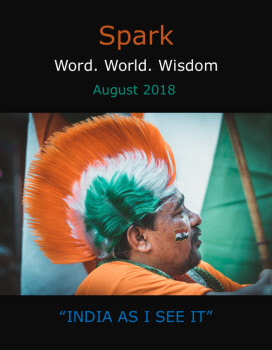by Pranav Mishra
The Heathen
Years ago, I sat on the dungy floor, with my back resting against the battered wall and cows urinating and defecating in front of my eyes. I was dazed from lack of sleep, but I knew the fetter on my leg was real. I knew it from history. It wasn’t the first time. I also knew it from the smell of cow-dung that was pasted on my face the previous night and had by morning turned dry and fissured. I sat there like a degraded bitch.
My drowning eyes faintly registered two legs approaching from the enclosure’s wide gate. I skulked further back, pushing the wrecked wall that would not yield. A leg rose in the air and pummeled my body thrice, the same way the heavy pestle thrusts inside a grain-mortar. The first fell on my stomach, the second on my measly breasts, and the third was poorly blocked by my hands. It landed on my face and jolted my jaws and teeth. The leg belonged to my father.
I could not look up, not because I was terrified, but because I felt guilty. I felt guilty of loving the wrong man, a man from the lower caste, a carpenter, who was at that very moment lying inside a government hospital, struggling for his life. Ultimately he would survive.
What remained of our great love, which once appeared stronger than the mountains and vaster than the sea? Guilt.
The Fallen
I can’t even try to begin telling my story if you set your eyes on me, if your eyes start judging me. You know what I have hated the most in my life? Eyes. Eyes, eyes, eyes. I still feel there are eyes all around me. They mock me, they humiliate me, they call me a whore, they call me the reason behind the decline of my father. The cursing from ten years ago still echoes in my ears. It robs me of my sleep, as I lie by the side of the drunken old pig I never loved.
Ten years ago, I was too little to understand anything. I was sixteen, living in Agra in an old, crumbling area in the vicinity of the Taj Mahal. The milky domes of the Taj and its four minarets were visible from the roof of my decaying house. And that’s where it started; my little, sordid affair: the roof of my house.
Looking back I tend to believe it was inevitable. He was handsome and intelligent and lonely and gloomy. And I was terrified of the cards my future hid from me. I was going to get married in two months and I already hated the boy my parents had found for me. He was a spindly, paan-chewing, bidi-smoking, tharra-drinking guy working as a peon in a government office. I hated my parents for agreeing to the proposal. I was good-looking and keen on continuing my education.
He was a writer, staying with us as a tenant. He was writing a story based in Agra, of course with a bit of Taj Mahal in it. The first two weeks were sober. Then one day he came to me as I spread washed clothes for drying, over a wire that ran from this corner to that. He enquired about my marriage, and the way I felt about it. I was a fool. I trusted him. In no time he dragged me to bed and disappeared a month later while I was away at school. And then one day I was pregnant, and my parents thrashed me for days before dragging me to a gynaecologist for abortion.
It could not remain hidden. An acquaintance of my father spotted us outside the hospital and later enquired from one of the compounders about the matter. I was filthy and immoral, a wasted whore, an unruly slut. I was a fallen girl made for flogging. The news spread like an inferno. My would-be husband’s family declined the wedlock. In that scoundrel’s place came another rascal, albeit an old one, a man forty years older than me.
I was guilty, and I was punished heavily.
But I have a question to ask: why was I punished for someone’s lustful intentions and my parents’ ugly designs for me? I was still too young to understand many things. I was studying in class ten. I walked to my school in a white shirt, and a white frock, a bag loaded on my back. I was just too little to understand the vicious turns the events could take. I had presumed through my sweetness and innocence that I would be ultimately forgiven. But I was not.
To be innocent in an age of cruelty and devilishness − that’s the source of my guilt.
The Rebel
Thirteen years ago, when I was fourteen, I had taken a challenge − a raw challenge, a dangerous challenge. I had to walk through Papamau’s filthy streets in denims! The girls of my class had pumped me up. ‘Only you can do it!’ ‘Someone has to do it!’ ‘You are our leader!’ Indeed, I was the leader of the girls of my class. Though not all aspects of my persona were positive. I smoked and drank sometimes, only sometimes, maybe once in a fortnight, but I did. I read those cheap books which are sometimes passed as romantic. I had started dreaming about my prince. Nah, he would not be from Papamau’s stupid lot. He would be rational and robust, heroic and brave, and he would treat me with respect, he would love me like no man has ever loved a woman.
So, I was the leader and now I had to raise the bar. The dreaded pair of jeans would be brought to me from the city that stood forty miles away. Of course, something as scandalous as jeans could not be found in Papamau’s garment shops.
The girls made me wear it one fine Sunday afternoon, and I set out to conquer the world. But soon, I realized my blunder. Those filthy boys and men were teasing me, whistling at me, spitting dirty comments all the while. A pebble hit my back, another landed on my hip. I was made to retreat in barely ten minutes. I had to retreat. There was no other option. It was proving to be too dangerous.
I met my father on the way. Someone had called him regarding my disgraceful, shameless project. He was burning with rage. He gripped my arm in a hurting manner and dragged me all the way to our house.
‘This!’ he yelled to my mother. ‘This! This!’ He was so angry and overtaken by shame that he was finding it hard to speak. His trembling index finger was pointing at the brand new denims in a radiant blue, smelling of fresh fabric.
‘What’s this, girl?’ my mother yelled, gripping my hair and pulling it back.
‘Jeans,’ I answered. ‘It’s just jeans!’
‘They’ll spit on us,’ my father yelled, finding the ability to speak at last. ‘Can’t you think about us a little? Wasted girl!’
He was on the verge of crying, and I felt an ocean of guilt surging through my heart. I started weeping, as my mother pulled my hair.
‘I am sorry, Papa,’ I said, pleading. ‘Please forgive me this time. I will never do it again.’
My father walked out of the house, my mother went into the kitchen, and I suffered alone, with my guilt.






